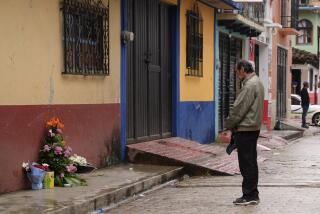El Salvador Urged to Reinvestigate ’89 Priest Slayings
SAN SALVADOR — Friends and colleagues have taken steps this week to reopen the investigation into the 1989 murders here of six Jesuit priests--a highly publicized, brutal act that caused the United States to reexamine its long, costly involvement in Central American civil wars.
“The case of the Jesuits has been presented to the Inter-American Human Rights Committee of the Organization of American States to propose a friendly arrangement with the Salvadoran government to find out the truth about the masterminds” of the killings, Father Rodolfo Cardenal said Thursday. He is vice rector of the University of Central America, where the slain priests taught.
This is the second time in a month that the Salvadoran government has been called on to reinvestigate atrocities that occurred in the 12-year civil war that claimed an estimated 70,000 lives and created hundreds of thousands refugees before it ended in 1992.
Human rights groups three weeks ago asked for further inquiries into the 1980 murders of four U.S. religious women after four of the five soldiers convicted of the killings said they had acted on orders from superiors.
Judicial sources said this week that the five soldiers convicted of the women’s slayings will be freed from prison any day now under a new penal code that lets prisoners with good conduct be released after completing half their sentences.
Military officials have reacted angrily to the requests for new investigations.
Retired Gen. Mauricio Vargas, who held high command posts during the war, told reporters that these were attempts to disgrace the armed forces.
But “these cases keep resurfacing because they were never satisfactorily cleared up,” said Henry Campos, a law professor at UCA, the Jesuit university.
The truth about the cases must be known, said Father Jon Sobrino, who lived and worked with the murdered priests, adding: “A country that continuously lies about what has happened cannot prosper. We want to know the truth--whether the defense minister gave the order, whether [the] president [Alfredo Cristiani] was implicated.”
The murders of the priests, several of them internationally respected researchers, shocked the world and forced the United States to reconsider its multimillion-dollar support for the war effort of El Salvador’s right-wing government, which was fighting leftist guerrillas.
“This accelerated the peace negotiations,” said Sobrino, who escaped death with the six other priests only because he was on a visit to Thailand. Many observers believe that the murders helped shift the United States from pressing for a military victory to favoring a negotiated peace.
At dawn Nov. 16, 1989, UCA Rector Ignacio Ellacuria, Vice Rector Ignacio Martin-Baro, Segundo Montes of the Human Rights Institute, three others, their housekeeper and her daughter were killed by gunshots at their home on the university campus.
The killers left a sign, referring to the initials of a leftist guerrilla group, reading: “The FMNL executed spies. Win or die. FMNL.”
Many on the Salvadoran right still believe that the Marxist insurgents of the Farabundo Marti National Liberation Army were responsible for the killings as part of an elaborate plot to discredit the armed forces.
During the war, and still today, the UCA provokes enormous hostility from the Salvadoran right because it publishes research that documents the economic and social disparities in this country. This grates on many because the university was founded in 1965 as an anti-Communist bastion, in reaction to the influence of Marxism in the National University of El Salvador.
Father Charles J. Beirne, the institution’s historian, said UCA is considered “the university of the poor . . . because it spoke out on their behalf, it gave them a voice.”
Nine officers and soldiers were arrested in the priests’ murders. In 1981, the top officers accused, Col. Guillermo Alfredo Benavides and Lt. Yusshy Rene Mendoza, were sentenced to 30 years in prison; the other seven were absolved.
The two officers were freed in a 1993 amnesty.
That same year, a United Nations-sponsored truth commission found that the killings were ordered by members of the military high command who later engaged in a cover-up to clear themselves.
“The report is explicit about the planning . . . but there are probably other clues that the commission did not follow up,” Cardenal said. He emphasized that the Jesuits do not want revenge or prison sentences for the masterminds, but they are determined to learn the whole truth behind the murders.
“If the government does not respond or does not satisfy the [human rights] commission, the commission can go before the Inter-American Human Rights Court in Costa Rica,” he said.
Darling is chief of The Times’ San Salvador Bureau, where Aleman is a researcher.
More to Read
Sign up for Essential California
The most important California stories and recommendations in your inbox every morning.
You may occasionally receive promotional content from the Los Angeles Times.










